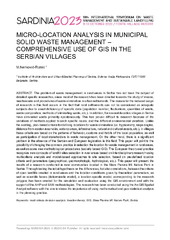Приказ основних података о документу
Micro-location analysis in municipal solid waste management – comprehensive use of GIS in the Serbian villages
| dc.creator | Nenković-Riznić, Marina | |
| dc.date.accessioned | 2023-11-29T08:33:57Z | |
| dc.date.available | 2023-11-29T08:33:57Z | |
| dc.date.issued | 2023 | |
| dc.identifier.isbn | 978-8-86-265033-5 | |
| dc.identifier.issn | 2282-0027 | |
| dc.identifier.uri | http://raumplan.iaus.ac.rs/handle/123456789/906 | |
| dc.description.abstract | The problem of waste management in rural areas In Serbia has not been the subject of detailed specific researches, since most of the research has been directed towards the study of means, mechanisms and procedures of waste elimination in urban settlements. The reason for the reduced scope of research in this field occurs in the fact that rural settlements can not be considered as adequate subjects due to usual deficiency of specific data (population number, fluctuations, quantities of waste, waste composition, methods of eliminating waste, etc.). In addition, for several decades villages in Serbia have eliminated waste primarily spontaneously. This has proven difficult to research because of the variations of methods applied to each specific locale, and the different environmental variables. Unlike the existing, plan-based criteria for defining locations for waste elimination (i.e. hypsometry, slope angles, distance from waster-reservoirs, watercourses, infrastructure, natural and cultural assets, etc.), in villages these criteria are based on the patterns of behavior, customs and habits of the local population, as well as participation of local stakeholders in waste management. On the other hand, there is a significant problem in the absence of the Serbian and European legislation in this field. This paper will point to the possibility of changing the common practice in selection the location for waste management in rural areas, as well as some new methodological procedures (socially based GIS). The European theory and practice recognize new concepts of landfill sites selection in rural areas based on interdisciplinary research using multi-criteria analysis and model-based approaches to site selection, based on pre-defined location criteria and parameters (geographical, geomorphologic, hydrological, etc.). This paper will present the results of a research conducted in rural communities located in the Stara Planina Mt. Nature Park in Serbia. Through testing the initial hypothesis on the differences, but also correlations, between the criteria of open landfills created in rural areas and the location conditions given by theoretical parameters, as well as scientific bases (deterministic model), a location-specific model, corresponding to the research polygon, has been created for the simulation and evaluation using the GIS environment and with the support of the AHP and SAW methodologies. The research has been conducted using the ArcGIS Spatial Analyst software with the aim to stress the importance of using mathematical and geo-statistical analysis in the planning practice. | sr |
| dc.language.iso | en | sr |
| dc.publisher | Padova : CISA | sr |
| dc.relation | info:eu-repo/grantAgreement/MESTD/inst-2020/200006/RS// | sr |
| dc.rights | openAccess | sr |
| dc.source | Book proceedings from 19th International symposium on waste management, resource recovery and sustainable landfilling | sr |
| dc.subject | multi-criteria decision analysis | sr |
| dc.subject | location theory | sr |
| dc.subject | GIS | sr |
| dc.subject | Stara Planina Mt. Nature Park | sr |
| dc.subject | Serbia | sr |
| dc.title | Micro-location analysis in municipal solid waste management – comprehensive use of GIS in the Serbian villages | sr |
| dc.type | conferenceObject | sr |
| dc.rights.license | ARR | sr |
| dc.citation.rank | M33 | |
| dc.identifier.fulltext | http://raumplan.iaus.ac.rs/bitstream/id/3682/2428_Nenkovic-Riznic.pdf | |
| dc.identifier.rcub | https://hdl.handle.net/21.15107/rcub_raumplan_906 | |
| dc.type.version | publishedVersion | sr |

